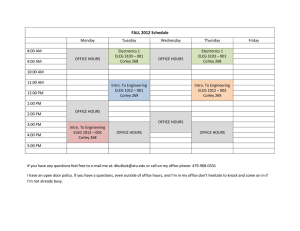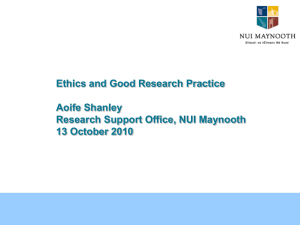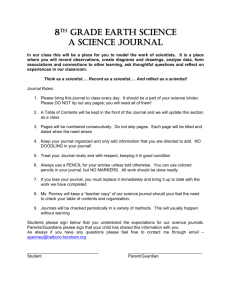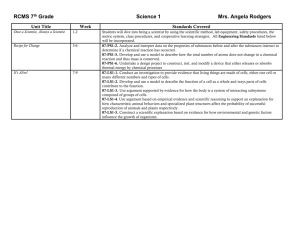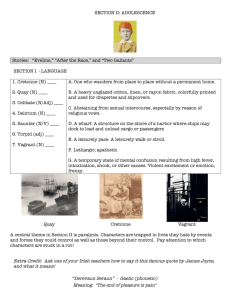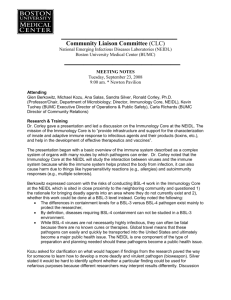Research Essay
advertisement
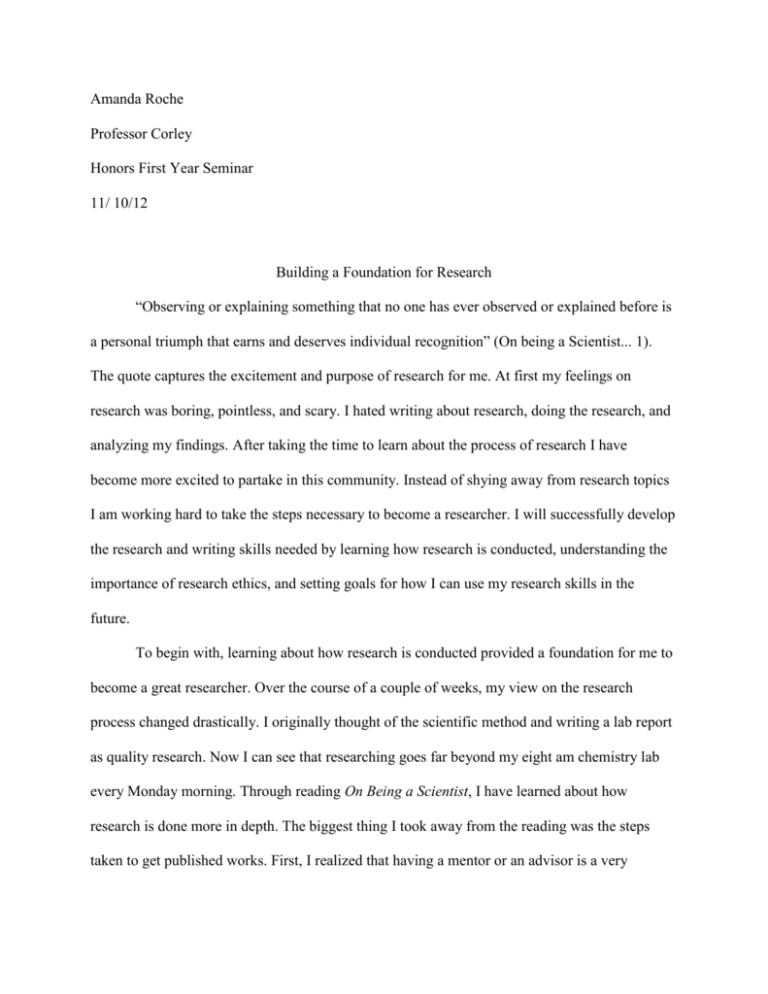
Amanda Roche Professor Corley Honors First Year Seminar 11/ 10/12 Building a Foundation for Research “Observing or explaining something that no one has ever observed or explained before is a personal triumph that earns and deserves individual recognition” (On being a Scientist... 1). The quote captures the excitement and purpose of research for me. At first my feelings on research was boring, pointless, and scary. I hated writing about research, doing the research, and analyzing my findings. After taking the time to learn about the process of research I have become more excited to partake in this community. Instead of shying away from research topics I am working hard to take the steps necessary to become a researcher. I will successfully develop the research and writing skills needed by learning how research is conducted, understanding the importance of research ethics, and setting goals for how I can use my research skills in the future. To begin with, learning about how research is conducted provided a foundation for me to become a great researcher. Over the course of a couple of weeks, my view on the research process changed drastically. I originally thought of the scientific method and writing a lab report as quality research. Now I can see that researching goes far beyond my eight am chemistry lab every Monday morning. Through reading On Being a Scientist, I have learned about how research is done more in depth. The biggest thing I took away from the reading was the steps taken to get published works. First, I realized that having a mentor or an advisor is a very important part of becoming a successful researcher. This part especially was interesting for me because it will help me find a good starting point for my career as a researcher. After finding a mentor there were many other parts including picking a research group, recording your finding, submitting your work to the peer-review journal, and finally getting your work published. A lot goes into a research project, more than I ever knew, and reading about it made the whole idea of research overwhelming. It was extremely helpful when older students in the Honors Program came in and talked about their own research from their efolio. Their talk was short, but it helped me feel comfortable and more confident that I too can achieve what I set out to do. Next, the research process goes a step further into the importance of ethics. Thinking back to my high school days, I remembered doing labs in my science classes. If one of my results were way off then I would change the result to something closer to the correct answer versus retrying my experiment and keeping my original result. It never seemed like a huge deal as long as I received all of the points for my lab. After reading On Being A Scientist and hearing Dr. Corley’s personal story about plagiarism, my viewpoint changed even on the smallest things. From our reading, I learned how important research ethics is to the community of scholars all over the world. If we didn’t have the rule of ethics then the scientific findings and results of the research would not be seen as credible and researchers would not be respected. It is absolutely critical that in every step of the research process the researcher is always holding up to the scientific standard. An example of this is, “openness in sharing research materials, fairness in reviewing grant proposals, respect for one’s colleagues and students, and honesty in reporting research results” (On Being a Scientist… 3). The reading also covered scientific misconduct and the severity of being unethical, however this was made more real to me with Dr. Corley’s story. Being dishonest includes plagiarism, and that is a very serious misconduct that occurs. I couldn’t imagine how difficult it must have been for Dr. Corley to accuse a fellow scholar of plagiarism. It was not easy for either Dr. Corley or the student who plagiarized but it had to be done or both would be breaking the rule of ethics. This story combined with the excellent information in our reading has informed me of the severity of staying ethical while researching. Lastly, as I learn more about the topic of research I have begun to set expectations for how I will develop and practice my own research skills throughout my years in college. In my earlier years at MSU I will continue to work on my information literacy and information synthesis so that the concepts are mastered by the end of my sophomore year. By completing my First Year Seminar course and writing research papers in my other classes, I will practice using my research skills. I have already begun this process in my Spanish class since I do research for our compositions. Now I will apply what I have learned to take my research papers from standard to extraordinary. In my later years I hope to take what I have developed and go a step further into original research and dissemination of results. After a talk with Dr. Corley and through the Undergraduate Research Center I have learned of a research project lead by Dr. Sandell in the Education field. I aspire to be a part of her research team so that I will be able to continue developing and practicing my research skills. In the end, I feel I have learned an incredible amount about research skills that will help me grow and develop into a member of the community of scholars at Minnesota State University, Mankato. I feel confident that by first learning how research is properly conducted I will be able to develop my own skills in researching. Also by understanding the role of ethics and its great importance in research I can apply that to my responsibilities as a future scholar. After mastering the first two concepts I know that I will be able to put my writing and research skills to good use in the future when I eventually begin my own research Works Cited On Being a Scientist: A Guide to Responsible Conduct in Research. Washington, D.C.: National Academies, 2009. Print.
